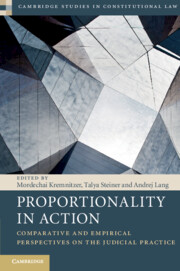Book contents
- Proportionality in Action
- Cambridge Studies in Constitutional Law
- Proportionality in Action
- Copyright page
- Contents
- Figures
- Tables
- Contributors
- Preface
- Cases
- Introduction
- 1 Proportionality Analysis by the German Federal Constitutional Court
- 2 Proportionality Analysis by the Canadian Supreme Court
- 3 Proportionality Analysis by the South African Constitutional Court
- 4 Proportionality Analysis by the Israeli Supreme Court
- 5 Proportionality Analysis by the Polish Constitutional Tribunal
- 6 Limitation Analysis by the Indian Supreme Court
- 7 Comparative and Empirical Insights into Judicial Practice
- Index
6 - Limitation Analysis by the Indian Supreme Court
Published online by Cambridge University Press: 14 April 2020
- Proportionality in Action
- Cambridge Studies in Constitutional Law
- Proportionality in Action
- Copyright page
- Contents
- Figures
- Tables
- Contributors
- Preface
- Cases
- Introduction
- 1 Proportionality Analysis by the German Federal Constitutional Court
- 2 Proportionality Analysis by the Canadian Supreme Court
- 3 Proportionality Analysis by the South African Constitutional Court
- 4 Proportionality Analysis by the Israeli Supreme Court
- 5 Proportionality Analysis by the Polish Constitutional Tribunal
- 6 Limitation Analysis by the Indian Supreme Court
- 7 Comparative and Empirical Insights into Judicial Practice
- Index
Summary
The chapter presents an analysis of the practice of limitation analysis in the case law of the Indian Supreme Court. Based on both a qualitative and quantitative analysis of a large sample of case law relating to claims for limitation of the rights to equality, fundamental freedoms, and life and personal liberty, the chapter deconstructs the Court’s approach to identify the distinct elements of limitation analysis, and argues that though the Court has not expressly articulated a single structured test for the validity of rights limitations, in practice the Court generally examines three elements: worthy purpose, rational nexus (at times including narrow tailoring), and a general balancing between various interests at stake. Quantitative indicators are used to provide an overview of the characteristics of limitation analysis in action, including the rights and subject matters to which limitation analysis is applied and the division of labour between the components of the analysis when striking down measures. The findings demonstrate that the majority of limitations struck down are based on either lack of legitimate purpose, lack of rational nexus, or both. The chapter further analyses qualitatively the formulations and applications in practice of each of the components of limitation analysis.
Keywords
- Type
- Chapter
- Information
- Proportionality in ActionComparative and Empirical Perspectives on the Judicial Practice, pp. 458 - 541Publisher: Cambridge University PressPrint publication year: 2020

